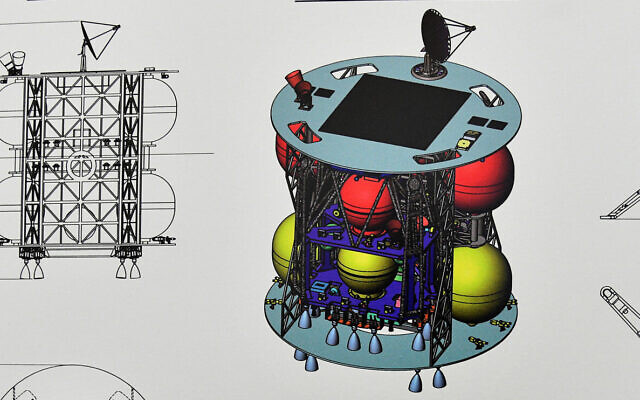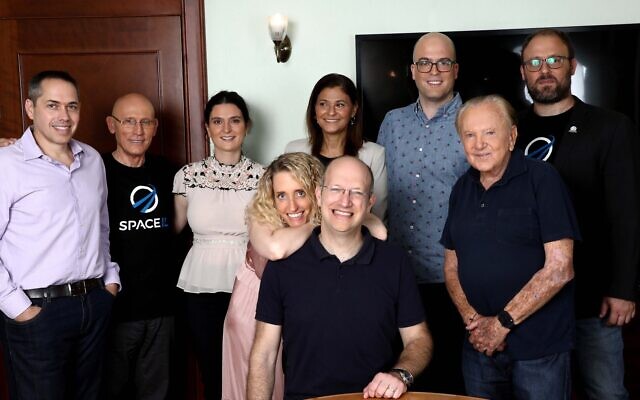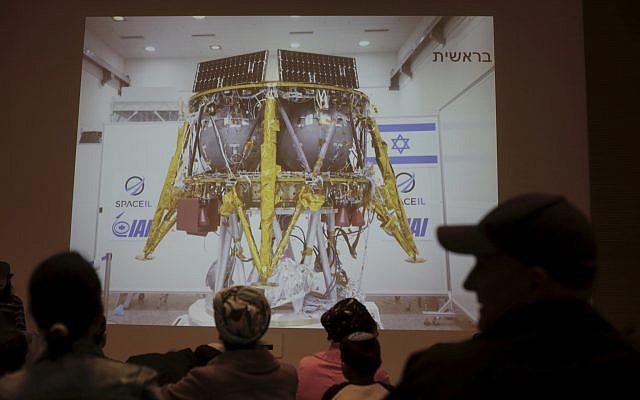Israel’s SpaceIL organization, embarking on a second mission to the lunar surface in 2024 following a failed landing bid two years ago, issued a call for proposals from space organizations worldwide for scientific experiments that may become part of the mission, dubbed Beresheet 2.
Universities, research institutes, and companies in the space sector across the globe will have until November 15 to submit their ideas, as the organization prepares to launch the moon mission, SpaceIL said on Thursday.
The organization announced late last year that the Beresheet 2 mission would aim to break several records in global space history, including a double landing on the Moon in a single mission by two of the smallest landing craft ever launched into space, each weighing 120 kilograms (265 pounds), half of which is fuel. The landers will launch on an orbiting spacecraft and then detach to take on the second part of their missions. One of the landers will attempt to touch down on the far side of the Moon, which only China has accomplished to date, and the second spacecraft is scheduled to land at an as-yet-undetermined site on the Moon.
The orbiting spacecraft, meanwhile, will remain in space for up to five years and serve as a platform for educational science activities in Israel and worldwide via a remote connection that will enable students in multiple countries to take part in deep-space scientific research, according to the organization.
SpaceIL said on Thursday that the proposed submissions can focus on various research areas including lunar soil, lunar environmental conditions, astrobiology, and the production of food and water.
In July, the organization raised $70 million from investors for the second mission, estimated at $100 million. The financing was raised from a group of entrepreneur-philanthropists, comprising Patrick Drahi, from the Patrick and Lina Drahi Foundation; South African billionaire Morris Kahn and the Kahn Foundation, which also backed the first Beresheet mission; and the Moshal Space Foundation, in partnership with Entrée Capital.

A conceptual schematic for the Beresheet 2 lander, released to the media on December 9, 2020. (Haim Zach/GPO)
The first Beresheet spacecraft crashed into the moon’s surface in April 2019 during its attempt to land on Earth’s satellite, dashing the hopes of hundreds of engineers who had worked on the project for years. The spacecraft successfully initiated the landing sequence, but a few kilometers above the moon’s surface the main engine failed, meaning the spacecraft could not properly brake in time to cushion its landing.
The first spacecraft was budgeted at $100 million, a fraction of the cost of vehicles launched to the moon by major powers US, Russia and China in the past. It was a joint venture between SpaceIL and Israel Aerospace Industries, funded almost entirely by private donations from well-known Jewish philanthropists, including Kahn, Miriam and Sheldon Adelson, Lynn Schusterman, and others.

SpaceIL’s Kfir Damari, right to left, Morris Kahn, Jonathan Weintraub, Yariv Bash, Amalia Zarka, Dafna Jackson, Angelina Drahi, Shimon Sarid and Aviad Eyal. (Sivan Faraj)
The SpaceIL project launched as Israel’s entry into the Google LunarX challenge for nongovernmental groups to land a spacecraft on the moon. Google ended the contest in 2018 with no winners, but the Israeli team decided to continue its efforts privately.
Upon completion of the financing round for Beresheet 2, a new board of directors was appointed for the organization, which includes the representatives of the new donors. Morris Kahn was appointed as chairman of the board of directors alongside new directors Angelina Drahi, chairwoman of the Patrick and Lina Drahi Foundation; Amalia Zarka, general manager of the Drahi Philanthropic Foundation; Tal Granot-Goldstein, CEO of HOT Group; Frank Melloul, CEO of i24news; Aviad Eyal, managing partner of Entrée Capital and the representative of the Moshal Space Foundation; and Dafna Jackson, CEO of the Kahn family office.

People watch the live broadcast in Netanya, on April 11, 2019, of the SpaceIL Beresheet lunar landing attempt. (AP/Ariel Schalit)
They joined the existing board members, including Prof. Isaac Ben-Israel, chairman of the Israeli Space Agency and the National Council for Research and Development; Avi Hasson, former chief scientist at the Economy Ministry; and Arie Halsband, an aviation and aerospace entrepreneur.
“The Beresheet project is my life’s mission, so I decided to take it up again,” Kahn said in a statement at the time. “I plan to do everything that is within my power to take Israel back to the Moon, this time for a historic double landing. As an entrepreneur, I believe that one should constantly seek new challenges and even double the risk. Our upcoming new mission will position Israel once more as a global pioneer, this time in space.”
SpaceIL, founded by Yariv Bash, Yonatan Winetraub, and Kfir Damari, is a nonprofit organization that strives to inspire the next generation of scientists, engineers, and dreamers through innovative space missions. The organization has hundreds of volunteers and in several years of operation has managed to reach more than two million children, the company has said.
SpaceIL issues call for scientific research proposals on 2nd moon mission - The Times of Israel
Read More

No comments:
Post a Comment